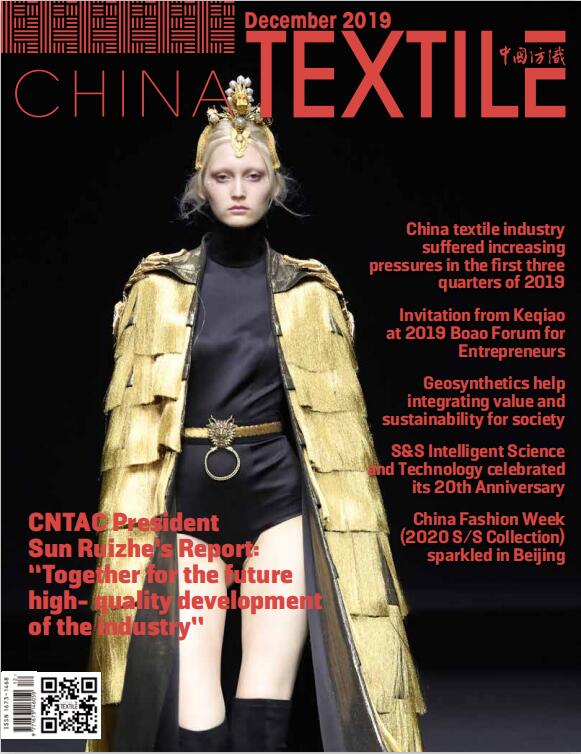Prime Source Forum 2017: Surviving, sourcing in uncertain times, focus of this year’s event
May 11, 2017 | by Flora Zhao
Two broad themes dominated the discussions at the Prime Source Forum (PSF) held in Hong Kong (March 13 - 14, 2017), first, economic environment in 2017 given the uncertainties in new sourcing landscape, survival under global political frictions; second, getting ready to meet the demands of millennial consumers - an individual who wants to “look now, buy now and wear now” through digitisation, automation, and e-commerce. Around 300 senior executives from global fashion supply chain spread across 20 countries attended the two-day forum.
The tone was set by Anson Bailey, Principal, Business Development, KPMG, Master of Ceremonies for PSF in his opening remark, “We live in interesting and challenging times.” This was followed by a welcome address by Hon Gregory So Kam-leung, Secretary for Commerce and Economic Development, Government of the Hong Kong Special Administrative Region. “Fashions change but change is always the fashion. Fashion is always evolving and continuously gives us new stimulants. To keep up with the fast pace of the fashion sector, one needs to think fast by anticipating, spotting and setting trends; act fast by repositioning for new markets, new strategies, and new mission; and stay fast by maintaining efficient supply chain management and keeping close to suppliers and customers,”said Leung.
On similar lines, Willy Lin, Chairman, Hong Kong Productivity Council and Hong Kong Shippers’ Council added implementations of protective measures, forthcoming elections in France are adding to the uncertainty. Challenges and opportunities being set by new technologies and changing business models like e-commerce, need to be seriously addressed.
Focus on Uncertainty
In his keynote address, Colin Browne, President, Global Sourcing of Under Armour, proposed that the world in 2017 can be described through four overlapping themes: “Regionalization”, “Made in America”, “Connected Consumer” and “Corporate Responsibility”.
Describing each theme, he suggested that politics are shifting away from Globalization to “Regionalization”, as counties become more protectionist. It is for the first time to move towards “Glocalization” where both onshore and offshore production should be balanced.
The next theme follows on with “Made in America”. New innovative production and materials allow some production to move back onshore. Browne indicated the need to consider total costs and value as opposed to just FOB costs. This will allow us to better service our consumers, which echoed with his third theme, “Connected Consumers”.
Consumers have very different demands and expectations including speed, experience and customization, and expect products and services in “Corporate Social Responsibility”, the fourth theme detailed in Browne’s speech.
His speech set the tone for the event. He went to say, “I don’t think, TPP and single trade deals are on the cards, there will be bilateral trade deals but Globalization will slowdown. There are opportunities but as an industry executives need to rethink their traditional low labour cost and long lead time model.
In “CEO Dialogues”, Ben Simpfendorfer, Founder and CEO, Silk Road Associates, spoke on “The end of the global supply chain, as we know it!” He pointed out global supply chain is experiencing new stress due to rising costs, political and anti-trade policies, complex and fragmented supply chains. China is losing market share in clothing and footwear but gaining share in electronics.
The following session centered around global trade and regulatory landscape. Dr. Ms Yifan Hu, CIO Greater China and Chief China Economist, UBS, opined closer sourcing would have an impact on China because of rising costs, demand for fast fashion, more taxes and uncertainties. However, she said China is re-energized, improved on its technical side; hence it stands a good chance even in the new regulatory landscape.
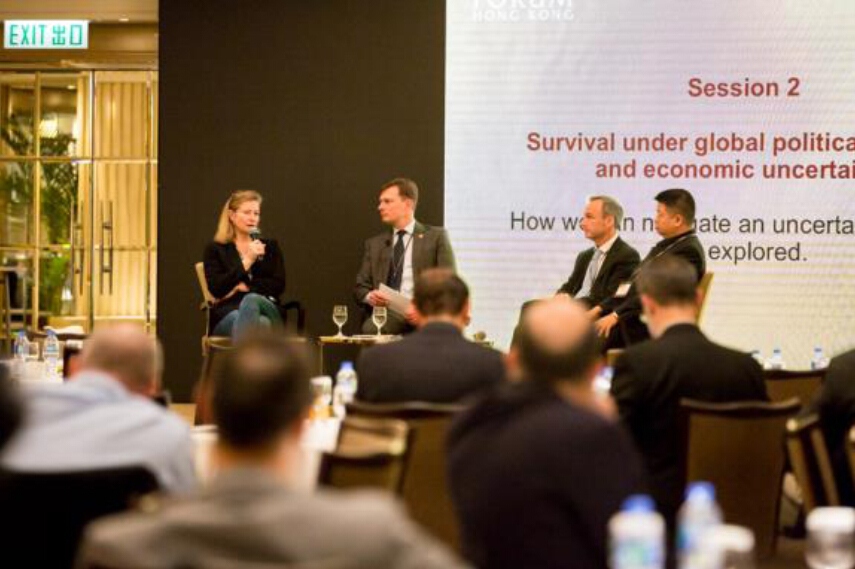
A session on survival under global political frictions and economic uncertainty, dealt on growing political upheavals across the world. The moderator, Christian Ewert, Director General, Foreign Trade Association explained, “We advocate against trade barriers, those restrict free trade. 2017 has not started too well for the open trade, as Trump signed to pull out of TPP. Withdrawal is unhealthy and protectionism is against globalization. France is going for elections; all these developments are setting uncertainty. In 70s, EU got together, countries had duties over 20 percent and now it is between 1 - 2 percent. Brexit is also raising some question marks; overall, business environment is not easy”.
The later part of the day had an interesting session on Sourcing 2020, what does future fashion sourcing landscape hold? “Sourcing 2020 has to address Consumer in 2020, as manufacturing landscape is changing and moving,” remarked Ms Anne-Laure Descours, Global Director, Development and Sourcing Apparel, Puma SE. The buzzwords would be: collaboration, engagement, flexibility, adaptation and agility.
Technology, Automation, Data and Digitalisation, the way forward
Stuart Cranfield, Group Head of Supplier Working Conditions, C&J Clark International Ltd. explained, “Sourcing in next five years, or by 2020, as it is too soon, will only have evolution and not revolution. Reengineer product and process, partnership approach is going to be more critical. We may not have changed fast but we have changed.” He outlined the trends impacting supply chain: faster speed to market, consumer wants to see now, buy now and wear now. There is a demand for broader assortments, smaller runs and personalization. It is the era of reduced inventories where stores have become extensions of distribution centers. These are driven by technology-led innovation like connected wearables.
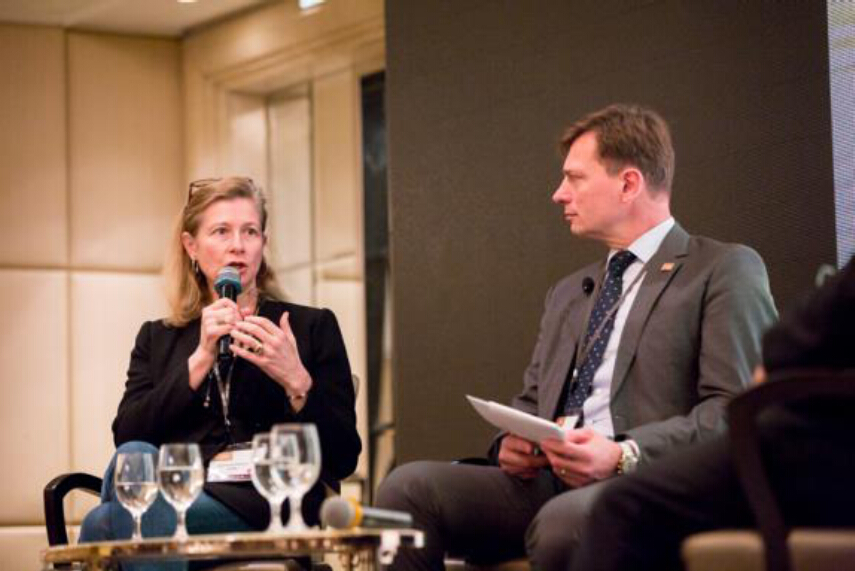
Next session on changes in fashion supply chain management and rising star of e-commerce decoded the expanse of e-commerce & m-commerce. Thibault Villet, Co-founder & CEO, Mei.com advised all CEOs engaged in China, in wake of online sales, since it will be almost half the sales in China and increasing social power of WeChat, they need to have strategic approach and goals, which partner to work with, recruit the right team - millennial and others and balance “We need to learn and mentor. We need to be open minded and collaborative with this millennial.” Villet advised adoption of omni-channel value chains and working closely with designers and platforms. Recruiting and empowering millenniums to drive change. In short, disrupt or be disrupted.
Minnie Bu, Cloud ERP/SCM Solution Director, Oracle Applications Asia Pacific says, the new China is still coming from old generation, most successful online businesses in China are headed by people who are around 50 years old. “We must start understanding and collaborating with millennial. China is unique. We already have well designed platforms, effective logistics and secured online payment systems. Same business model duplicated in any other country may not work and may need changes. Every time you talk about technology solution, now it has to be on mobile.”
Doug Kang, VP Channels & Alliances, Coupa Asia Pacific Japan pointed out technology is playing an increasing role, retail and fashion industry seriously lacks technological investments.
Moderated by Andreas Kim, MD, Greater China, Lectra, the session on “How to survive in the disruptive era and is technology the answer?” focused on millennial, digitization, big data and China. Kim said millennial will transform global economy. “We talked about millennial as consumer but these will also be part of workforce 2 billion millennials across the world and 435 million in China, 86 percent of millennial in developing countries and 65 percent of them in three countries viz. China 30 percent, Brazil and India together 35 percent make up total 65 percent.”
On the topic, China’s evolving economy will have global consequences and Made In China 2025, Janice Wang, CEO & Co-Founder, Alvanon said, “Cross-collaboration is needed to cover the skill gap, learning of industry paired with millennial and new technology bridging the gap. Training millennial about the process and then allowing them to think about disrupting the process, it is a combination of people and mindset.”
Angie Lau, CEO, Clover Group Intl said they started using RFID 11 years ago and migrated technology from scanner to 3D that is technology transformation. “Millennial doesn’t want to enter this iconic industry, we don’t have the kind of investment required for technological upgradation, and it can’t be done alone without the help of government and educational institutes.”
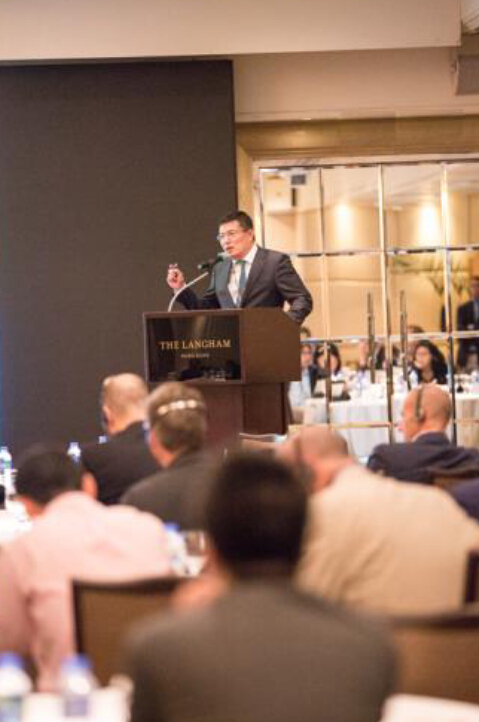
Hong Tianzhu, CEO, Texhong Intl Holdings Ltd. was of the opinion that new normal in China is rising wages and evolving consumption. “Earlier, we had high and rapid growth. Now the new normal is medium or slow speed of growth (6.5 percent). Core concept of new normal is that innovations occur in developed countries.” Cost of manufacturing is not alone in the process part, it is also related with raw material, and all related costs have to be accounted for. “That’s why, we need verticalization. Only those who can survive in China, manage elsewhere.” On opportunities for China – Made in China 2025 via transformation and upgrade, Belt and Road Initiatives + TPP 2.0, we have to be more responsive in future. Made in China 2025 would be to make more profits. Industry is not aiming for a huge market but unfortunately targeting smaller sets Hong pointed out.
The entire forum highlighted millennial will transform the global economy. Digitization will force companies to reinvent themselves. Industry 4.0 will nurture new model.
Focus on Ethiopia, Africa

The second day began with a keynote address by Hon Dr. Arkebe Oqubay, Minister and Special Advisor to the Prime Minister, the Federal Democratic Republic of Ethiopia. Speaking on why invest in Ethiopia he said, “Ethiopia has been recognized as the fastest growing country in Africa. GDP growth is 11 percent for last 13 years. FDI has been flowing, primarily in manufacturing including from China. It employs active labour force of 50 million who are English speaking, and also produces 100,000 graduates every year. Proximity to the EU, US, Middle East and Asia and duty free access to the US and EU through AGOA and EBA, preferential duty treatment to markets such as China, India, Japan, Canada and Australia are added advantages.”
Energy/electricity rate is one of the lowest in the world. It enjoys zero tax on exports and zero income tax for 10 years and free land.
Dr. Oqubay said, with 1.1 bn population African countries need manufacturing sector. Jobs need to be created as for every direct job, two indirect jobs are created. “The three key elements needed for clear vision on apparel sector: first, work with closer partners, focus on productivity (skills development/labour intensive); second, availability of sound infrastructure/ample energy; third, learning – government is clear that we need to learn from private sector.”
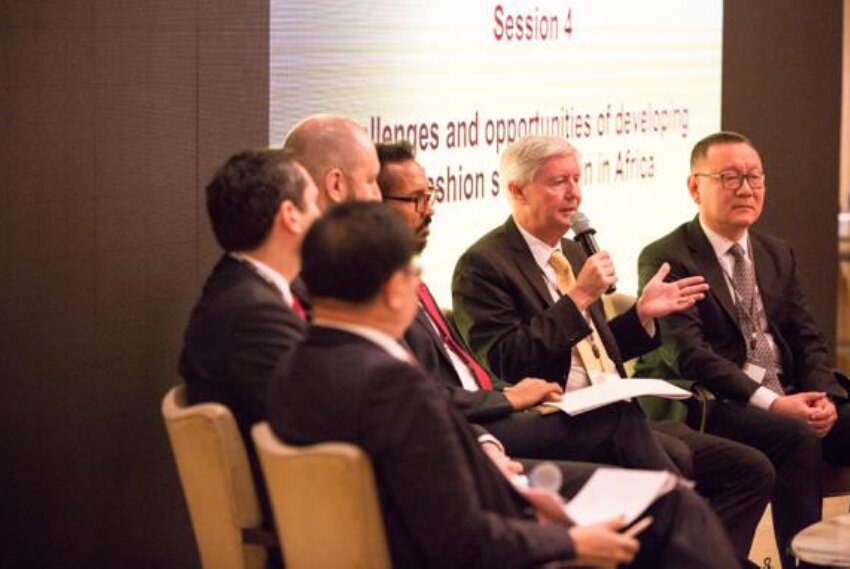
Mark Green, EVP, Global Supply Chain, PVH gave out a check list for sourcing from any region: cheap labour/infrastructure/green energy and duty free access to the US/EU and many Asian countries/incentives from government, government’s desire to boost the industry … which showed Ethiopia a perfect match.
World Fashion Design Competition honors best in class designers
The 2nd World Fashion Design Competition (WFDA) was held concurrently, with 12th PSF, highlighted the collaboration amongst producers, designers and buying offices of multinational brands and e-tailers. Twelve finalists coming from mainland China, Hong Kong and Macau competed in five prizes.
Leo Wong of iGift Co., Ltd. Macau won half of the prizes, including Excellence in Innovation and Excellence in Functionality, and most importantly was the Overall Champion of the Competition. Samuel Wong of Samuel Way Bespoke Shoecrafter also received the prize, Excellence in Commercialization from Hon. Gregory So Kam-leung and Alessandra Cocchi, Managing Director of Eastmax Fashion. Excellence in Aesthetic went to Pang Ningning from the Beijing Institute of Fashion Technology on behalf of Toread. The beautiful world map on her ski jacket left very strong impression on judges. Pang’s representative received the prize from Bart De Meirsman, Managing Director of QuikSilver.
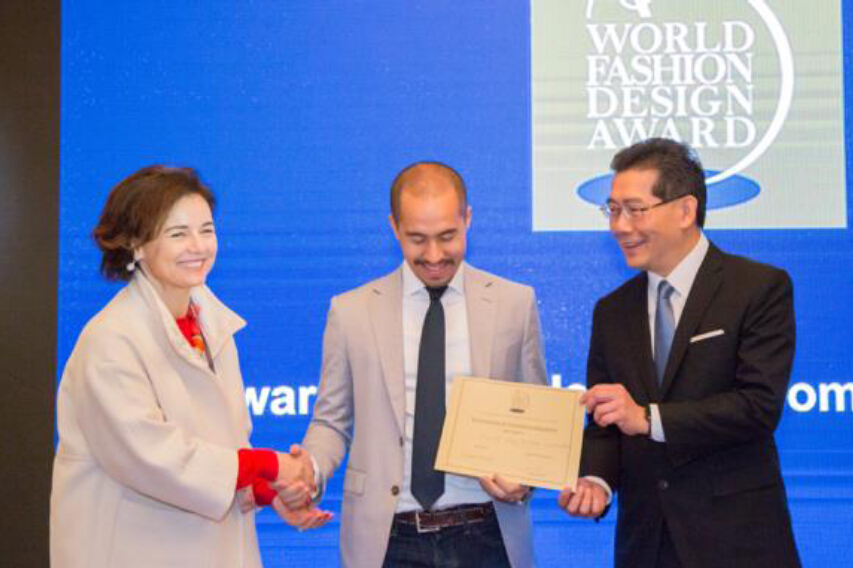
Mr. Samuel Wong of Samuel Way Bespoke Shoecrafter received an award of Excellence in Commercialization from Hon. Gregory So Kam-leung, GBS, JP, Secretary for Commerce and Economic Development, the Government of the Hong Kong Special Administrative Region and Ms. Alessandra Cocchi, Managing Director of Eastmax Fashion Co.
The jury comprised Alessandra Cocchi and Sylvia Li of Eastmax Fashion; Bart De Meirsman, Managing Director of QuikSilver; Dr. Winnie Yu, Professor of ITC, Hong Kong Polytechnic University; Gail Taylor, Professor of Donghua University; Ricky Lau, renowned fashion designer and Anderson Lee, Chairman, Sustainable Fashion Business Consortium who was also Master of the Award Ceremony.
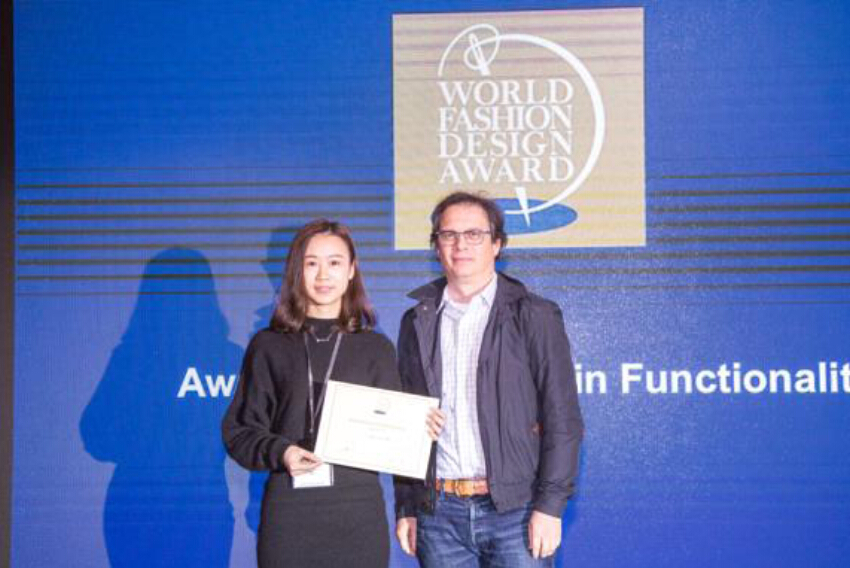
Mr. Bart De Meirsman, Managing Director of QuikSilver presented the award of Excellence in Functionality to a representative of iGift Co Ltd Macau.
YEH SHEN Ltd, WFDA’s organiser will continue to promote the concept to a greater extent, and hopefully there will be more participants with even higher standards of new products to join the competition and to offer more choices with quality to buying offices in the coming years. Martin Keil, Managing Director of YEH SHEN Ltd recognized the involvement of university graduates and manufacturers to develop new garment collections together in the 2017 Competition.
“The goal of WFDA is very much aligned with the mission of Lectra which has been committed to training future professionals in design and product development. Lectra provides tools to, shares best practices and expertise with 850+ schools and universities around the world to train their students, which offers students a great opportunity to learn to take a greater control over processes and at the same time add value to their creativity,” said Andreas Kim, Managing Director of Lectra Greater China, which was the exclusive sponsor of this year’s WFDA.
This interaction between the industry and the world of education offers Lectra an international community to link up companies, schools and new talents together, as what they did with Fashion Institute of Technology (FIT) and JCPenney in the past years.
The next PSF and WFDA Award Ceremony are scheduled in Hong Kong again in Spring 2018.
About Prime Source Forum (PSF)
Prime Source Forum (PSF) was initiated by APLF in 2006 to address the issue of quota elimination in the apparel industry. After its staging in the industry for eight years, starting from October 2013, PSF has been organised by YEH SHEN Ltd under license of APLF.
Snapshots of PSF - The signature event of the Global Fashion Industry
• Initiated in 2006, located in Hong Kong, one of the most essential global fashion sourcing hubs
• Attended by decision makers from 1,000+ organisations over the past 12 years
• Catering to senior executives of the entire range of stakeholders along the fashion supply chain
• Attracting some 350 senior executives from 20+ countries to attend annually


